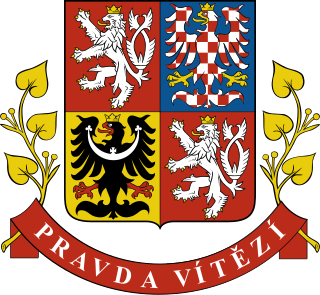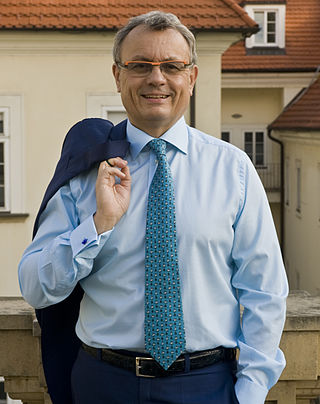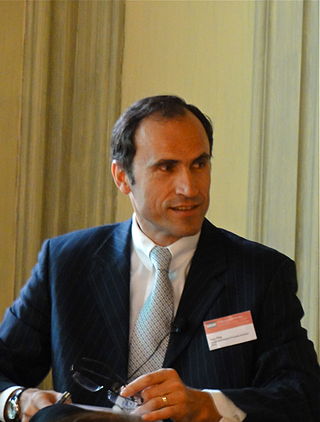
The Velvet Revolution or Gentle Revolution was a non-violent transition of power in what was then Czechoslovakia,occurring from 17 November to 28 November 1989. Popular demonstrations against the one-party government of the Communist Party of Czechoslovakia included students and older dissidents. The result was the end of 41 years of one-party rule in Czechoslovakia,and the subsequent dismantling of the command economy and conversion to a parliamentary republic.

Václav Klaus is a Czech economist and politician who served as the second president of the Czech Republic from 2003 to 2013. From July 1992 until the dissolution of Czechoslovakia in January 1993,he served as the second and last prime minister of the Czech Republic while it was a federal subject of the Czech and Slovak Federative Republic,and then as the first prime minister of the newly independent Czech Republic from 1993 to 1998.

The president of the Czech Republic,constitutionally defined as the President of the Republic,is the head of state of the Czech Republic and the commander-in-chief of the Armed Forces of the Czech Republic.

Charter 77 was an informal civic initiative in the Czechoslovak Socialist Republic from 1976 to 1992,named after the document Charter 77 from January 1977. Founding members and architects were JiříNěmec,Václav Benda,Ladislav Hejdánek,Václav Havel,Jan Patočka,Zdeněk Mlynář,JiříHájek,Martin Palouš,Pavel Kohout,and Ladislav Lis. Spreading the text of the document was considered a political crime by the Czechoslovak government. After the 1989 Velvet Revolution,many of the members of the initiative played important roles in Czech and Slovak politics.

The Civic Democratic Party is a conservative and economic liberal political party in the Czech Republic. The party sits between centre-right and right-wing on the political spectrum,and holds 34 seats in the Chamber of Deputies,and is the second strongest party by number of seats following the 2021 election. It is the only political party in the Czech Republic that has maintained an uninterrupted representation in the Chamber of Deputies.

The Civic Forum was a political movement in the Czech part of Czechoslovakia,established during the Velvet Revolution in 1989. The corresponding movement in Slovakia was called Public Against Violence.

Czech National Social Party is a civic nationalist political party in the Czech Republic,that played an important role in Czechoslovakia during the interwar period. It was established in 1897 by break-away groups from both the national liberal Young Czech Party and the Czech Social Democratic Party,with a stress on achieving independence of the Czech lands from Austria-Hungary. Its variant of socialism was moderate and reformist rather than a Marxist one. After the National Labour Party dissolved and merged with National Socialists in 1930,the party also became the refuge for Czech liberals. Its best-known member was Edvard Beneš,a co-founder of Czechoslovakia and the country's second President during the 1930s and 1940s.
Marián Čalfa is a Slovak former politician,who served as prime minister of Czechoslovakia during and after the Velvet Revolution in 1989,as well as de facto acting President for 19 days. He was a key figure in the smooth transfer of power from Communist rule to democracy.

Mirek Topolánek is a Czech politician and business manager who served as the prime minister of the Czech Republic from 2006 to 2009 and the leader of the Civic Democratic Party (ODS) from 2002 to 2010. Between 2006 and 2009,Topolánek was the member of the Chamber of Deputies (MP) and senator from Ostrava from 1996 until 2004. After leaving the politics in 2010,Topolánek has been active in the electric power industry as a vocal lobbyist for the fossil fuel industry.

Indirect presidential elections were held in the Czech Republic on 8–9 February 2008,in which Parliament elected the President. The candidates standing for election were the incumbent president Václav Klaus and University of Michigan Professor Jan Švejnar.

Vladimír Dlouhý is a Czech economist and politician.

Indirect presidential elections were held in the Czech Republic in January and February 2003 to elect a new President. The Parliament of the Czech Republic failed to elect a candidate on the first two ballots on the 15 and 24 January. However,on the third round of the third ballot on 28 February,Václav Klaus was elected.

Ivan Pilip is a Czech politician and economist who was finance minister from June 1997 to July 1998,after having been the Minister of Education,Youth and Sport from 1994 to 1997.

Presidential elections were held in the Czech Republic in January 2013,the country's first direct election for the presidency. No candidate received a majority of the votes in the first round on 11–12 January,so a second round runoff election was held on 25–26 January. Nine individuals secured enough signatures or support of parliamentarians to become official candidates for the office. MilošZeman of the Party of Civic Rights (SPOZ) and Karel Schwarzenberg of TOP 09 qualified for the second round,which was won by Zeman with 54.8% of the vote,compared to Schwarzenberg's 45.2%. Zeman assumed office in March 2013 after being sworn in.

A leadership election for the Civic Forum party was held in Czechoslovakia on 13 October 1990. Václav Klaus was elected the leader of the party,defeating Martin Palouš. Election was held in Hostivař. Klaus received 115 votes while Paloušonly 52.
This page lists nationwide public opinion polls that have been conducted relating to the 2003 presidential elections in the Czech Republic.

An election of the President of the Senate of the Czech Republic was held on 18 December 1996. Petr Pithart was elected the first President of the Senate. Pithart was a candidate of the Christian and Democratic Union –Czechoslovak People's Party (KDU-CSL),and his election was opposed primarily by the Civic Democratic Party.

















